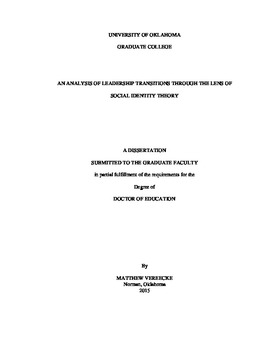| dc.contributor.advisor | Adams, Curt | |
| dc.contributor.author | Vereecke, Matthew | |
| dc.date.accessioned | 2015-06-23T21:03:48Z | |
| dc.date.available | 2015-06-23T21:03:48Z | |
| dc.date.issued | 2015 | |
| dc.identifier.uri | https://hdl.handle.net/11244/15220 | |
| dc.description.abstract | The purpose of this study was to explore leadership transitions in private school environments through the lens of social identity theory. The study relied on qualitative analysis of in-person interviews with three leaders who had recently (within the previous three to five years) been part of a successful leadership transition. The data from these interviews were connected to surveys of teachers from each of the three schools and used scales adapted from Platow and van Knippenberg (2001) that suggested social identity theory can explain the psychological processes that can lead to successful or unsuccessful transitions. The findings in these real world settings were consistent with social identity theory literature and suggest that leadership transitions can be explained by the theory. | en_US |
| dc.language | en_US | en_US |
| dc.subject | Education, Administration. | en_US |
| dc.subject | Education, Social Sciences. | en_US |
| dc.subject | Succession | en_US |
| dc.subject | Social Identity Theory | en_US |
| dc.title | AN ANALYSIS OF LEADERSHIP TRANSITIONS THROUGH THE LENS OF SOCIAL IDENTITY THEORY | en_US |
| dc.contributor.committeeMember | Forsyth, Patrick | |
| dc.contributor.committeeMember | Edwards, Beverley | |
| dc.contributor.committeeMember | Frick, William | |
| dc.contributor.committeeMember | Brenda, Lloyd-Jones | |
| dc.date.manuscript | 2015 | |
| dc.thesis.degree | Ed.D. | en_US |
| ou.group | Jeannine Rainbolt College of Education::Department of Educational Leadership and Policy Studies | en_US |
| shareok.nativefileaccess | restricted | en_US |
